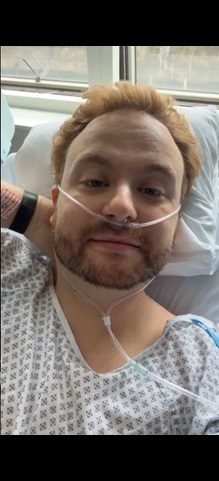St Mary's Hospital is early adopter of innovative obesity treatment
Imperial College Healthcare is one of the first NHS trusts in London, and one of just 11 across the country, to start offering a new, minimally invasive treatment option to patients with obesity, recently carrying out its first 'Endoscopic Sleeve Gastroplasty' (ESG) at St Mary’s Hospital.
ESG is designed to be a day case procedure, which can mean quicker recovery times and could also help improve waiting times. ESG is not a surgical procedure – rather it involves passing a flexible tube (endoscope) into the patient's mouth and to their stomach where a tiny suturing device stitches together parts of the stomach to reduce its size. This creates a sense of fullness and reduces the amount of food that can be eaten at one time.
(Image courtesy of Boston Scientific)
First procedures at St Mary's Hospital
The bariatric and gastroenterology team at St Mary’s Hospital launched ESG within the Trust and recently performed their first procedure (in mid-May), following its approval for use in the NHS by the National Institute for Health and Care Excellence (NICE) earlier this year. This adds to the range of specialist weight management treatments provided by the Trust, including lifestyle and dietary advice and bariatric surgeries, and will allow care to be personalised more closely to each patient’s needs and preferences.
The procedure has a significant evidence base and is recognised by NICE as an effective and safe intervention.
Obesity is a challenge in the UK, with around one in every four adults and around one in every five children aged 10 to 11 living with obesity. It's a serious health concern that increases the risk of many other health conditions, including type 2 diabetes, coronary heart disease, and cancer.
Some people living with obesity may require specialist support from services like the Imperial Weight Centre at St Mary's Hospital, which provides both medical care and bariatric surgery, and is involved in cutting edge research.
How it works
The procedure is conducted under general anaesthetic. ESG is a day case procedure, although some patients may stay overnight in the hospital for observations. The procedure involves a thin and flexible tube with a small camera inside being passed through the patient’s mouth into the stomach. The team then use the tiny device on the end of the tube to stitch and fold together parts of the stomach wall to reduce the volume of the stomach (by 70-80%). After the procedure, patients receive specialist dietetic input, just like patients who undergo bariatric surgery.
Currently ESG is available in 11 NHS hospitals nationwide, including St Mary’s Hospital. The Trust uses the OverStitch™ Endoscopic Suturing System from Boston Scientific.
Dr Karl King Yong, Consultant gastroenterologist at Imperial College Healthcare, led the team performing the procedure. He said: “I'm thrilled to announce that we can now offer ESG as a treatment option for our patients, expanding our existing range of lifestyle, medical, and surgical interventions.
“This wouldn't have been possible without the invaluable mentorship and guidance of Dr Devinder Bansi, one of the UK’s leading gastroenterologists in ESG. I would like to extend my deepest gratitude to our incredible bariatric surgical colleagues and my gastroenterology department for their unwavering support in developing and integrating ESG into our comprehensive bariatric interventions.”
Ahmed Ahmed, Clinical lead for bariatric surgery at Imperial College Healthcare, said: “This is good news for patients and staff alike. It means we have another option to treat patients, to complement our existing options.
“It’s also designed to be a day-case procedure, which can mean quicker recovery times and also help our teams to see more patients overall. Congratulations to everyone involved.”
Astrid Monteau, vice president of Endoscopy at Boston Scientific in Europe, Middle East and Africa, said: “NHS data shows that approximately 25% of London's population are living with obesity.
“These statistics underscore the pressing health challenges faced by the city, where obesity-related health inequalities disproportionately impact the most vulnerable groups. The introduction of Endoscopic Sleeve Gastroplasty expands patient choice, providing a minimally invasive option with a shorter recovery time that can lead to improved patient outcomes. This innovation represents a pivotal moment in healthcare, emphasising the importance of offering patients diverse and personalised care options.”
Yves' story
Yves Renuixen-Mencel received the procedure at St Mary’s Hospital in mid-May and returned home the same day. Yves was referred to the hospital’s bariatric and gastroenterology team by his GP after struggling with his weight since facing a series of health difficulties from 2019.
Yves said: "I've always been really active and loved going to the gym. But everything changed after my cancer diagnosis in 2019. The health difficulties I faced since then prevented me from exercising, and I started putting on weight.
“This issue was exacerbated by the pandemic when I was classed as ‘Clinically Extremely Vulnerable’ and had to lockdown for an extended period. The impact was tremendous, both physically and mentally. But now, I’m starting to feel much more like myself again. I'm regaining control over my life and looking forward to being back in the gym and maintaining a healthy weight, as guided by my doctors.
“I know there are others out there struggling with weight issues, possibly hesitant to seek help. If there’s one thing I’ve learnt over the past few years, it’s that there is help available, and you shouldn’t hesitate to ask your GP for it."



.jpg?rev=02651b6e1f5549b68acd13e8cd48e737&bc=ffffff&w=954&h=556&as=1&la=en&hash=FE4C0582C3F47D2717888A6D0FB800AB)